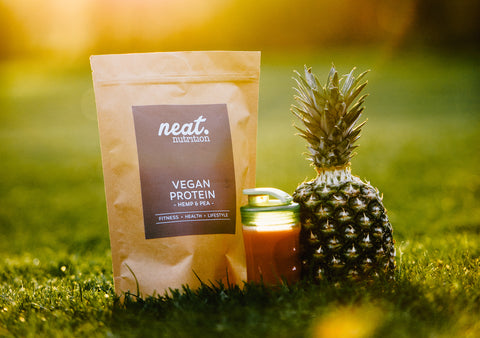Macronutrients: Protein

So the main supplement my good friends here at Neat stock is protein powder. What, I hear you say, is protein? Surely that's something that only body-builders need right? To get a better idea, let's look at it in more detail.
We all know that protein is the basic building block of muscles. What a lot of people don't realise is that proteins are the basis of other structures in the body such as skin, hair, nails and collagen which forms the basis of ligaments, tendons and cartilage. Ok, so you may have known that. Did you know that proteins are also the basis of hormones, enzymes, antibodies, haemoglobin...should I go on?
The basic building blocks of proteins are amino acids. There are twenty-two amino acids that the body uses, nine of which cannot be made by the body and are thus termed essential amino acids. These must be taken in from our diets. Three of these essential amino acids include the Branched Chain Amino Acids (BCAA) leucine, isoleucine and valine, which are great for protein synthesis.
So how much protein do you need? Protein intake and improved performance/muscle building is not a linear effect i.e. having more protein in your diet will not make you build more muscles or improve your performance. What is important though, is that if you are training your body has protein available to use in order to rebuild damaged muscles and increase muscle mass. A very common worry, especially amongst women, is the fear of getting big muscles. Correct exercise and nutrition doesn't do this. What it does do, is increase lean muscle mass, which means burning off fat and laying down muscle, i.e. becoming more toned.

If you train regularly you should be aiming for 1-2g of protein per kg of body weight. Obviously that’s a wide range, which needs to be adjusted depending on the type of exercise, the intensity and the frequency. So let's take an example and do some arithmetic (not my forte by any stretch), in order to give us an idea of how much protein that is. A 75kg man would require 1.6g/kg of protein per day:
75(kg) x 1.6(g/kg) = 120 grams of protein a day
Ok I hear you say, that doesn't sound like a lot. Don't forget that nothing is 100% protein and not all of that protein gets absorbed and used. Let's take chicken breast and eggs as our sources of protein and assume all the protein content gets absorbed. Chicken breast contains roughly 25-30g of protein per 100g whilst eggs contain 10-15g protein per 100g. A whole load of math later and it means that two chicken breasts will not be enough to meet the requirement. As for eggs, it would mean that this particular gentleman would have to consume about 18 a day.
I'm sure you'll agree that's quite a lot of chicken and eggs! And those are theoretical values. In practice you would actually need more. However, add a protein shake (24g of protein) and you not only reduce your dietary requirement by a fifth, but certainly whey protein has a very high rate of absorption and is almost fully utilised by the body. Don't forget also that in order to maximise the body's absorption of protein, you have to have carbohydrate with it, ideally in a ratio of 4:1 carb:protein.
Can you have too much protein? Of course! You can have too much of anything. The important thing to remember is that your use meets your demand. Personally I will have a protein shake after my morning training session, when my stomach doesn't take kindly to solids, or after my evening session if I know I won't be getting my dinner straight after.
This blog is written by friend of Neat, Dr Nick Ambatzis MB BS, MSc (SEM), MRCGP.
Nick is a General Practitioner specialising in Sports and Exercise Medicine. He completed his medical degree at University College London Medical School in 2002. Nick worked for almost ten years as a junior surgeon and spent three years in Trauma & Orthopaedics. He attained a Masters in Sports and Exercise Medicine and subsequently trained as a GP practising in Paddington.
From an early age, Nick has been both a keen cross-country runner and water-polo player, having competed at college level. Nick is also an accomplished ultra-marathon runner, having competed in many cross-country and cross-alpine races, ranging from 50-100 miles. He has also been a Crossfit and Crossfit Endurance coach.
